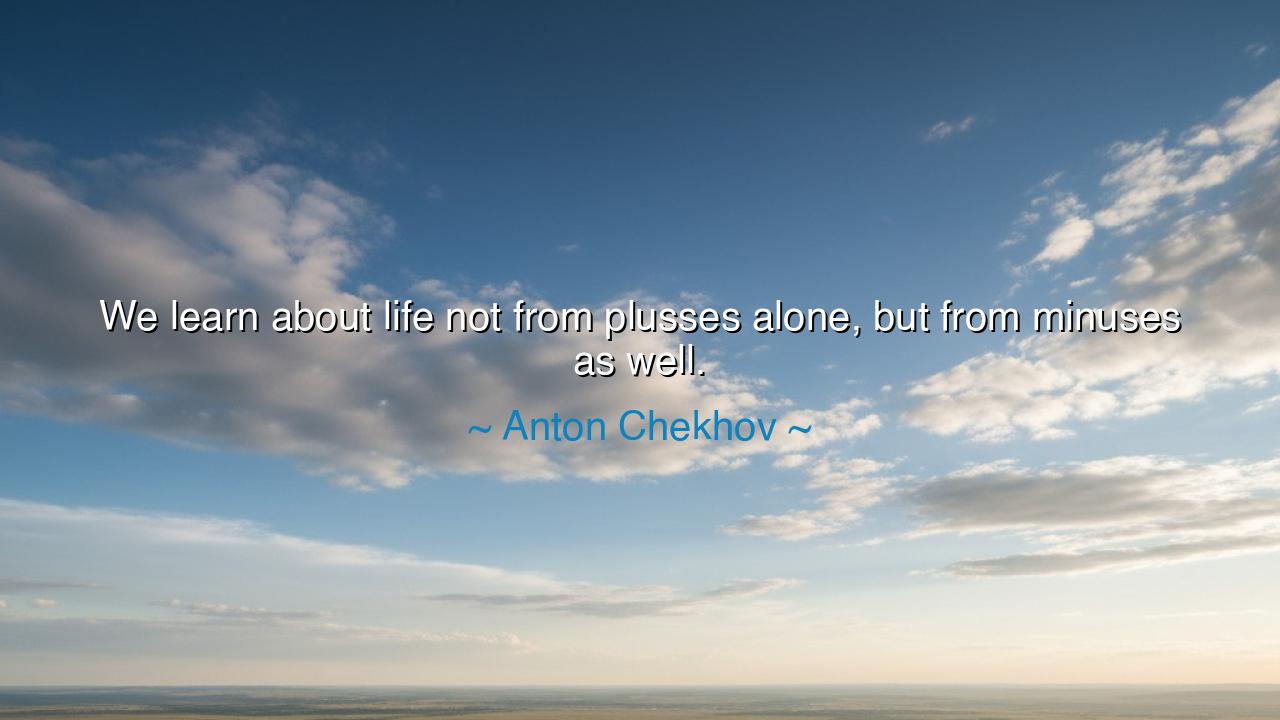
We learn about life not from plusses alone, but from minuses as






“We learn about life not from plusses alone, but from minuses as well.” — Thus wrote Anton Chekhov, the physician of the human soul, whose stories revealed both the quiet beauty and the hidden ache of existence. In this simple yet profound statement lies the balance of all wisdom: that joy and sorrow, gain and loss, success and failure — all are teachers in the great school of life. Chekhov, who understood human nature as few ever have, reminds us that to live fully is not to avoid pain, but to be transformed by it. For the plusses of life — pleasure, triumph, comfort — reveal the light, but it is through the minuses, the wounds and the weariness, that the soul learns depth.
The origin of this quote emerges from Chekhov’s letters and reflections on art, medicine, and the human condition. As both a doctor and a playwright, he witnessed life in its most fragile forms — in the laughter of the theatre and the silence of the sickroom. He saw how easily joy fades, how suffering carves wisdom into the heart. In his stories, no one escapes hardship, yet no one is without hope. His words, “We learn about life not from plusses alone, but from minuses as well,” come from that dual vision — the understanding that life’s wholeness is not found in perfection, but in its contrast. The light is meaningful only because of the shadow that defines it.
The ancients, too, knew this truth. The philosopher Heraclitus taught that “strife is justice,” that harmony is born from tension — as the string of the lyre must be stretched to sing. The Stoic Epictetus, once a slave, found freedom not in ease, but in endurance. They knew that adversity does not destroy the human spirit; it reveals it. Likewise, Chekhov’s wisdom echoes this eternal law: that the heart grows not when the path is smooth, but when it learns to walk even upon the stones. The minus in life — the moment of loss, the sting of rejection, the shadow of despair — is not a curse, but a calling to strength.
Consider the life of Helen Keller, born into silence and darkness. To most, her world would have seemed a prison. Yet from that darkness she built a vision brighter than any seen by the eyes. Her “minuses” — her blindness and deafness — became the very forge in which her spirit was refined. Through her struggle, she came to understand truths that the comfortable rarely glimpse. She once said, “Character cannot be developed in ease and quiet. Only through experience of trial and suffering can the soul be strengthened.” In her life, as in Chekhov’s teaching, we see that the minus is not the opposite of life — it is the depth of it.
Chekhov himself lived with frailty and illness, dying young from tuberculosis, yet he never allowed suffering to embitter him. He treated it as a companion in understanding humanity. His plays — The Seagull, Uncle Vanya, The Cherry Orchard — are filled with characters caught between hope and despair, love and disappointment, laughter and tears. Through them, he teaches that to be human is to live in the tension between opposites, to learn compassion from pain and humility from failure. Every minus, he tells us, adds meaning to the sum of our lives.
There is a quiet heroism in this teaching. For the modern soul, accustomed to comfort and afraid of imperfection, Chekhov’s words are a call to courage. We must not flee from life’s “minuses” — the losses, the rejections, the uncertainties — for they are the tutors of wisdom. Just as winter prepares the earth for spring, so too do hardships prepare the heart for joy. To live only for “plusses” is to live shallowly; to embrace both is to live deeply. The wise do not seek pain, but when it comes, they receive it with dignity, knowing that every trial carries within it a hidden gift.
Therefore, let this be the lesson: welcome all that life brings — not only the sweet, but also the bitter. When you fail, do not curse the fall; study it, and rise wiser. When sorrow visits, do not flee it; listen to its voice, for it will teach you empathy. When joy comes, hold it lightly, knowing that it shines brighter for the darkness that came before. Chekhov’s words are not an invitation to suffer, but to learn — to see in every plus and minus the arithmetic of the soul’s growth.
For in the end, life is not an equation of gains alone. It is a tapestry woven from both sunlight and shadow. The plusses give us happiness, but the minuses give us meaning. To live well, then, is to live completely — to embrace both sides of existence, and through them, to become whole.






AAdministratorAdministrator
Welcome, honored guests. Please leave a comment, we will respond soon